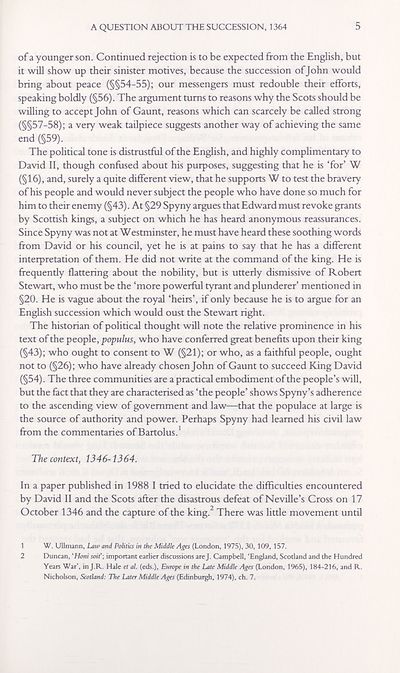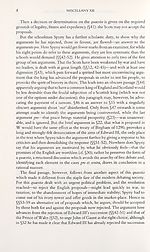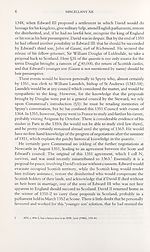Download files
Complete book:
Individual page:
Thumbnail gallery: Grid view | List view

A QUESTION ABOUT THE SUCCESSION, 1364
5
of a younger son. Continued rejection is to be expected from the English, but
it will show up their sinister motives, because the succession of John would
bring about peace (§§54-55); our messengers must redouble their efforts,
speaking boldly (§56). The argument turns to reasons why the Scots should be
willing to accept John of Gaunt, reasons which can scarcely be called strong
(§§57-58); a very weak tailpiece suggests another way of achieving the same
end (§59).
The political tone is distrustful of the English, and highly complimentary to
David II, though confused about his purposes, suggesting that he is ‘for’ W
(§16), and, surely a quite different view, that he supports W to test the bravery
of his people and would never subject the people who have done so much for
him to their enemy (§43). At §29 Spyny argues that Edward must revoke grants
by Scottish kings, a subject on which he has heard anonymous reassurances.
Since Spyny was not at Westminster, he must have heard these soothing words
from David or his council, yet he is at pains to say that he has a different
interpretation of them. He did not write at the command of the king. He is
frequendy flattering about the nobility, but is utterly dismissive of Robert
Stewart, who must be the ‘more powerful tyrant and plunderer’ mentioned in
§20. He is vague about the royal ‘heirs’, if only because he is to argue for an
English succession which would oust the Stewart right.
The historian of political thought will note the relative prominence in his
text of the people, populus, who have conferred great benefits upon their king
(§43); who ought to consent to W (§21); or who, as a faithful people, ought
not to (§26); who have already chosen John of Gaunt to succeed King David
(§54). The three communities are a practical embodiment of the people’s will,
but the fact that they are characterised as ‘the people’ shows Spyny’s adherence
to the ascending view of government and law—that the populace at large is
the source of authority and power. Perhaps Spyny had learned his civil law
from the commentaries ofBartolus.1
The context, 1346-1364.
In a paper published in 1988 I tried to elucidate the difficulties encountered
by David II and the Scots after the disastrous defeat of Neville’s Cross on 17
October 1346 and the capture of the king.2 There was little movement until
1 W. Ullmann, Law and Politics in the Middle Ages (London, 1975), 30,109,157.
2 Duncan, ‘Honi soil'; important earlier discussions arej. Campbell, ‘England, Scotland and the Hundred
Yean War’, in J.R. Hale et al. (eds.), Europe in the Late Middle Ages (London, 1965), 184-216, and R.
Nicholson, Scotland: The Later Middle Ages (Edinburgh, 1974), ch. 7.
5
of a younger son. Continued rejection is to be expected from the English, but
it will show up their sinister motives, because the succession of John would
bring about peace (§§54-55); our messengers must redouble their efforts,
speaking boldly (§56). The argument turns to reasons why the Scots should be
willing to accept John of Gaunt, reasons which can scarcely be called strong
(§§57-58); a very weak tailpiece suggests another way of achieving the same
end (§59).
The political tone is distrustful of the English, and highly complimentary to
David II, though confused about his purposes, suggesting that he is ‘for’ W
(§16), and, surely a quite different view, that he supports W to test the bravery
of his people and would never subject the people who have done so much for
him to their enemy (§43). At §29 Spyny argues that Edward must revoke grants
by Scottish kings, a subject on which he has heard anonymous reassurances.
Since Spyny was not at Westminster, he must have heard these soothing words
from David or his council, yet he is at pains to say that he has a different
interpretation of them. He did not write at the command of the king. He is
frequendy flattering about the nobility, but is utterly dismissive of Robert
Stewart, who must be the ‘more powerful tyrant and plunderer’ mentioned in
§20. He is vague about the royal ‘heirs’, if only because he is to argue for an
English succession which would oust the Stewart right.
The historian of political thought will note the relative prominence in his
text of the people, populus, who have conferred great benefits upon their king
(§43); who ought to consent to W (§21); or who, as a faithful people, ought
not to (§26); who have already chosen John of Gaunt to succeed King David
(§54). The three communities are a practical embodiment of the people’s will,
but the fact that they are characterised as ‘the people’ shows Spyny’s adherence
to the ascending view of government and law—that the populace at large is
the source of authority and power. Perhaps Spyny had learned his civil law
from the commentaries ofBartolus.1
The context, 1346-1364.
In a paper published in 1988 I tried to elucidate the difficulties encountered
by David II and the Scots after the disastrous defeat of Neville’s Cross on 17
October 1346 and the capture of the king.2 There was little movement until
1 W. Ullmann, Law and Politics in the Middle Ages (London, 1975), 30,109,157.
2 Duncan, ‘Honi soil'; important earlier discussions arej. Campbell, ‘England, Scotland and the Hundred
Yean War’, in J.R. Hale et al. (eds.), Europe in the Late Middle Ages (London, 1965), 184-216, and R.
Nicholson, Scotland: The Later Middle Ages (Edinburgh, 1974), ch. 7.
Set display mode to:
![]() Universal Viewer |
Universal Viewer | ![]() Mirador |
Large image | Transcription
Mirador |
Large image | Transcription
Images and transcriptions on this page, including medium image downloads, may be used under the Creative Commons Attribution 4.0 International Licence unless otherwise stated. ![]()
| Scottish History Society volumes > Series 5 > Miscellany of the Scottish History Society, Volume 12 > (16) Page 5 |
|---|
| Permanent URL | https://digital.nls.uk/127338993 |
|---|
| Description | Over 180 volumes, published by the Scottish History Society, containing original sources on Scotland's history and people. With a wide range of subjects, the books collectively cover all periods from the 12th to 20th centuries, and reflect changing trends in Scottish history. Sources are accompanied by scholarly interpretation, references and bibliographies. Volumes are usually published annually, and more digitised volumes will be added as they become available. |
|---|


